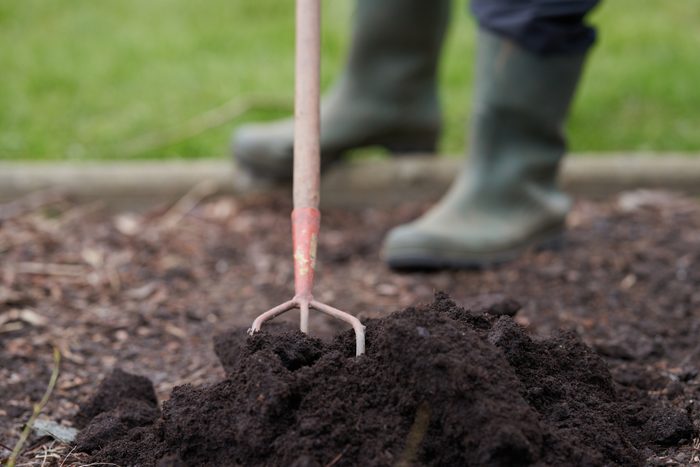
Bagged Mulch
If you don’t want to use leaves or don’t have any around, you can buy bagged mulch. Fornari recommends Coast of Maine Dark Harbor Blend Enriching Mulch for vegetable gardens. Its fine texture doesn’t suffocate young plants, and it decomposes by the end of the summer.

Corncob Mulch
If you live in a farming community, you may find corncob mulch at your local garden center. According to the University of Illinois (UI) Extension, corncob mulch is lightweight and easy to handle. University of Georgia (UGA) Extension says ground corncobs are another excellent mulch for the vegetable garden.
“A ground corncob mulch would be better than big cob pieces since larger chunks don’t smother weeds or keep in soil moisture,” Fornari says. “Corncob mulch is only locally available in places where this crop is grown. I know of no brand that sells it.”

Compost
Compost (leaves, grass clippings, newspapers, and other organic materials) is gardeners’ gold. While it looks like soil, compost’s end product, hummus, makes an excellent mulch that adds nutrients, moisture and weed control.
While you can add compost in spring, UGA Extension recommends putting unfinished compost as mulch around garden plants in fall. You can purchase compost if you don’t have a compost bin.

Hay and Straw
“I know that some people say to stay away from hay because it has weed seeds, but I think this is bad advice,” says Fornari. “Also, straw is widely available and sometimes free!”
Check with sources near you to find hay bales. Always remember to ask before taking any hay.
“Hay bales are often used for erosion control in construction projects,” Fornari says. “After the project is done, those hay bales would be free for the taking once you’ve connected with the contractors, of course. Hay can also be found on racetracks where it’s gotten too old or wet to use for the horses. And some farmers have hay that has gotten too wet for their animals.”
Straw is available nationwide. Buy EZ Straw online or find it and other brands at big box and other brick-and-mortar retailers and garden centers.
One Lowes.com reviewer called EZ Straw a great and convenient product, writing: “I’ve used this to protect freshly applied grass seed and also for weed control in the garden. The coverage is great, and it’s easy to spread.”

Cocoa Husks
Cocoa husks are a popular mulch. The husks (aka shells) of cocoa beans are light but won’t blow away in the wind. Some experts say cocoa husks shouldn’t be used because of their high potash content, but Fornari disagrees.
“Cocoa husks contain about 2.5% nitrogen, 1% phosphate and 3% potash,” she says. “None of those levels are very high, and all organic mulches decompose slowly, over time, without harm to plants as long as they’re put down in thin layers. The only concern about cocoa husks is that dogs are attracted to and might eat them. Cocoa is toxic to dogs.”

